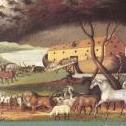-
Posts
537 -
Joined
-
Last visited
-
Days Won
1
Reputation Activity
-
 spamlds got a reaction from Just_A_Guy in Paul, Corinthians 8:13 and political correctness
spamlds got a reaction from Just_A_Guy in Paul, Corinthians 8:13 and political correctness
We have to look at the context of the situation Paul presents. The gospel going to the Gentiles was a new thing. The Jews who had accepted Jesus as their Messiah tended to hang on to their traditions, like circumcision. They had a strong revulsion against anything having to do with idolatry. The Gentiles didn't have this aversion as part of their culture.
The first controversy in the Church was over whether Gentile converts needed to be circumcised. In the minds of some, Christianity was a revision or reformation of Judaism. Thus there was an anticipation that the Gentiles needed to be circumcised and follow the other parts of the law of Moses. The Church had to resolve it in a conference in Jerusalem. The counsel that was given by the apostles to the Church is contained in Acts chapter 15.
28 For it seemed good to the Holy Ghost, and to us, to lay upon you no greater burden than these necessary things;
29 That ye abstain from meats offered to idols, and from blood, and from things strangled, and from fornication: from which if ye keep yourselves, ye shall do well. Fare ye well.
This was a struggle for many who were Jewish converts. It was a culture change that was appalling to them because they had to let go of certain prejudices against Gentiles and their ways. For example, a Jew would never eat the leftover food from a feast where that food had been offered to an idol. Even if they didn't participate in the sacrifice and offering to an idol, they would not want to even be associated with it after the fact. A Gentile wouldn't have that aversion.
Sometimes social situations would occur that tested the saints and even the apostles in this regard. Being sensitive to Jewish opinion in Antioch, Peter avoided entering into the houses of Gentiles. Perhaps he didn't want to stir up persecution or he may have been concerned for offending potential Jewish converts. Paul took him to task for it. Paul's devotion to "equality" was admirable, but the Church's leaders took a more conservative approach at the moment so as not to offend many. (Hmmm, sound like the priesthood ban to anyone?)
11 But when Peter was come to Antioch, I withstood him to the face, because he was to be blamed.
12 For before that certain came from James, he did eat with the Gentiles: but when they were come, he withdrew and separated himself, fearing them which were of the circumcision.
13 And the other Jews dissembled likewise with him; insomuch that Barnabas also was carried away with their dissimulation.
14 But when I saw that they walked not uprightly according to the truth of the gospel, I said unto Peter before them all, If thou, being a Jew, livest after the manner of Gentiles, and not as do the Jews, why compellest thou the Gentiles to live as do the Jews?
The "political correctness" involved here was downplaying the liberality of the gospel so as not to offend conservatives. It can also work the other way. Today we might be the minority, conservative opinion on issues like abortion or gay marriage and in some situations, it's better for us to not cause strife or contention, even while we don't yield on our values. We have to make the judgment call whether or not we should be strident and offend or quiet and not offend. Situations vary. We have to use discretion. There is a time when life demands that we take a stand and challenge others to make their decision for Christ and another time where we might quietly keep our standards and avoid forcing a decision on those who are not yet ready to be challenged in such a manner.
In all things, we keep the commandments. The need for discretion occurs when and how we declare that other people need to keep them.
-
 spamlds got a reaction from Sunday21 in counsel vs. commandment
spamlds got a reaction from Sunday21 in counsel vs. commandment
When we choose to disregard inspired counsel, we begin to orient our course away from the celestial kingdom. If we do not repent, we will drift away off-course.
Let me use an example. Go watch the movie Apollo 13. It's a gripping drama and a true life story. There's an important gospel lesson in it, believe it or not.
Apollo 13 experienced an explosion of an oxygen tank on the way out to the moon. The main spacecraft that was designed to return them to earth lost all its oxygen and all its electricity. The astronauts couldn't be sure, but it was assumed that the explosion destroyed their rocket engine that would allow them to control their flight path.
The astronauts relied on a "redeemer"--the spaceship that was designed to land them on the moon. It had enough oxygen to get them home--barely. This "redeemer" gave them hope, but they had to follow careful directions and listen to the instructions from mission control. Like us, we need to lean on the Redeemer and listen to Mission Control (the Spirit).
The venting oxygen gradually put them a few degrees off course. It was almost imperceptible, but the drift was very real. A few degrees, multiplied across almost a half-million miles would have been disastrous. Likewise with us, sin throws us off course. When we break commandments, it destroys our "life support system" and our ability to navigate our course back home. When we disregard inspired counsel--even a little bit, it has an impact. Multiplied over the course of a mortal life, it adds up. We can easily find ourselves way off-course, even though the error seemed almost negligible.
The astronauts had to reenter the earth's atmosphere at the perfect angle--going nearly 25,000 mph! There was no room for error. If they came in too steep, they'd burn up like a meteor. If they came in too shallow, they'd skip off the atmosphere like a stone skipping on a lake's surface.
Likewise, the way into the celestial kingdom is very "strait and narrow." The Savior said that "few there be that find it." If we fail to follow counsel of the Lord's inspired servants, our mistakes will lead to greater sins. We will find ourselves unable to make a proper "re-entry" to the celestial kingdom.
Repentance allows us to get back on course. Listen to "mission control"--the voice of the Spirit. If we don't follow the instructions or disregard them, we won't make it back.
-
 spamlds got a reaction from Windseeker in Why was it revealed to JS that 'all other creeds are an abomination?'
spamlds got a reaction from Windseeker in Why was it revealed to JS that 'all other creeds are an abomination?'
Farewell Iguy2314. I would simply like to comment on your approach to finding truth compared to the one taught by our missionaries. You urge anyone investigating the Church to start with C.S. Lewis. We urge people to ask of God. There is no more fundamental teaching that our missionaries present than James 1:5-6.
"If any of you lack wisdom, let him ask of God, that giveth to all men liberally, and upbraideth not; and it shall be given him.
But let him ask in faith, nothing wavering. For he that wavereth is like a wave of the sea driven with the wind and tossed."
When a person seeks religous truth, whether to believe in Christ or not, or whether to accept the precepts of a particular denomination as truth, he needs to go to the source: God.
I'm sure Iguy2314 did not intend this, but it'll ultimately be the outcome of his approach. His approach is to try to find the smartest guy around and then ask him for truth. The world is full of smart people who all disagree on what the truth is. Such an approach can only lead to confusion or deception.
Joseph Smith, although a real person, represents all of us as a proxy in one sense: he had to find out what was true amidst the "war of words and tumult of opinions" in the world around him. He, like Iguy2314 and many of the rest of us, inquired of the smartest, educated, and most well-informed people he could find. He read from the Bible and compared the smart guy's answers to it. Inevitably, he came to the solution that any honest person would come to. There's no way to know. The smart guys were all sincere and convinced they were right. Then he read James 1:5-6.
In a modern context, I would paraphrase this passage like this: If you lack knowledge about spiritual things, don't ask Google. Don't ask Yahoo Answers. Don't go to CARM, or MRM, or Ephesians2, or any of the various anti-Mormon ministries out there. Don't go to the Pope, Billy Graham, Pat Robertson, or Jimmy Swaggart. The professors of religion at the theological seminaries argue among themselves about what the Bible means. You won't get the answer you seek from them. Instead, ask of God.
Joseph Smith learned firsthand that God answers prayers and grants wisdom to those who ask him for it, in faith, believing that they will receive. The one caveat to all this is to set aside your pride and promise to follow God's answer when it comes. Have faith. Asking doesn't come without a price. Revealed truth requires you to commit to it once it is given to you. Clarity comes through personal revelation from God.
For any non-LDS visitor that reads this discussion, please ask yourself. Who would you trust more, C.S. Lewis or God? We urge every sincere seeker of truth to study the Bible and the Book of Mormon and then to ask of God if it is true. We ask this confidently knowing that God will never steer you wrong.
-
 spamlds got a reaction from theSQUIDSTER in Why was it revealed to JS that 'all other creeds are an abomination?'
spamlds got a reaction from theSQUIDSTER in Why was it revealed to JS that 'all other creeds are an abomination?'
A really good example of a creed would be the Westminister Confession of Faith. Normally, I try to avoid direct comparisons of one particular denomination's doctrine in a negative way. We are constantly the targets of such "analysis" by non-Mormons, but in this case, there is a useful point to be made.
The Westminster Confession contains a lot of language on many different points of doctrine which are at odds with revealed religion in general, but this one statement is illustrative of the attitude that makes such creeds an abomination to God.
"The whole counsel of God, concerning all things necessary for his own glory, man's salvation, faith, and life, is either expressly set down in Scripture, or by good and necessary consequence may be deduced from Scripture: unto which nothing at any time is to be added, whether by new revelations of the Spirit, or traditions of men."
Note the very last sentence in that declaration. Nothing is to be added--ever--to scripture "whether by new revelations of the Spirit or traditions of men." In one breath, they declare any future revelation from God to be invalid. If God chose to speak again, they are bound by their creed to not listen to God. In essence, they forbid God to speak. It is man telling God, "If you speak again, we won't listen to it because it's not in the Bible."
That is an example of an "abomination" to which the Lord referred. It is man telling God that, don't bother to talk again because we're not going to listen. You gave us the Bible and that's all we're going to believe. If you didn't think to put it in the Bible to begin with, we're not going to hear of it.
The Westminster Confession is the foundation of the "reformed" churches, particularly Presbyterianism. This creed is filled with such statements that actually try to limit God. If a person believed the doctrine taught in the creed, he would forever ignore "new revelations of the Spirit." Compare that to the Bible's teaching that the "...testimony of Jesus is the spirit of prophecy" (Revelation 19:10). The creed would deny individuals the chance to obtain the "testimony of Jesus" because "new revelations of the spirit" are to be rejected outright.
The creeds are an outgrowth of the spirit of Phariseeism. Each of them is an attempt to lock God into a box or a contract of some kind. It sets limits on what God can demand and what the believer can expect. They get in the way of personal contact with God.
Joseph Smith's experience in the First Vision tells us that God is not limited by the creeds. He defines the terms of our existence--we don't define the terms of his existence. He is real. He reveals himself as he sees fit. He commands and we are to obey. He is a personal God. He answers prayers and reveals truth to those who ask in faith.
There are those who have tried to compare our 13 Articles of Faith to the sectarian creeds. A careful reading of the Articles of Faith show that none of them limit God. They don't limit God's interaction with man. We believe that God will reveal whatever he will, whenever he wills it, to whomever he chooses to reveal it. In contrast, all the sectarian creeds draw a line that says, one one side of the line is orthodoxy and on the other is heresy. The Articles of Faith don't do that.
The Athanasian Creed ends with "This is the catholic faith, which except a man believe faithfully he cannot be saved." That's exclusionary language. It tells you that you're going to hell if you don't believe every point of it. The 2nd Council of Constantinople in 533 A.D. had a whole page worth of curses upon those who didn't believe every single point. You can read that document here.
http://www.creeds.net/ancient/2Constantinople.htm
It was this kind of stuff that led to all sorts of atrocities that became prevalent in Christendom of the Middle Ages. For example, in 891 A.D., Formosus, a conspirator who had been excommunicated for the murder of John, was elected pope. Five years later, Boniface VI becomes pope despite his being deposed as a deacon for his immoral and lewd conduct. Stephen VII, his succesor, had he body of Formosus disinterred, clothed in papal robes, and tried before a council. The indecent scene ended with cutting off three of the deceased's fingers and the corpse being cast into the Tiber River. Stephen was ultimately deposed and thrown into prison where he was strangled to death.
You can read a whole timeline of the Great Apostasy here:
http://spamldsarchive.blogspot.com/2010/05/great-apostasy-timeline.html
I could continue to elaborate, but suffice it to say that a study of the creeds by a person knowledgeable with the Bible will turn up numerous conflicts that are the products of men who denied the spirit of prophecy and revelation. The history of what happened to the Christian Church due to the rejection of contemporary, living prophets and apostles is a sad story of corruption and vice clothed in the garbs of religiosity.
The Lord called the creeds "abominations" because they stood as a centuries-old barrier between people who sought God and those who sought to limit God's ability to communicate with man by threats of violence, trial, hanging, burning at the stake, torture, and death. The glory of the First Vision swept all that away forever.
We know God lives. We know he speaks today. We know he can speak to us. We know he speaks to living prophets. The Church is connected to the "home office" in heaven once again.
-
 spamlds got a reaction from Magus in Angels
spamlds got a reaction from Magus in Angels
When I was on my mission in France, one of my companions and I baptized a man from Brazzaville, Congo. Hs name was Andre. He was a student at a French university in the city of Pau. After studying the gospel and attending meetings for several months, he was baptized after he began receiving revelatory inspiration through his dreams.
After Andre's baptism, he began sending copies of the Book of Mormon and various pamphlets home to his family and friends in Congo. There were no missionaries in that country at the time (around 1981-82). His mother and brother felt drawn to the gospel. His uncle, who was sort of a family patriarch, began to try to undermine the gospel message. There was no branch of the Church his mother and brother could attend. (Keep in mind that this was just a couple of years after the 1978 priesthood revelation and the work in English-speaking Africa was just beginning. The work in French-speaking Africa began to develop much later.) Essentially, my new convert's family had only the Book of Mormon and the prayer of faith on which to make any decisions about the gospel. Even if they believed, there was no Church presence for them to receive baptism.
By this time, I had been transferred to another area of the mission and I learned of this experience by a letter. After the uncle had troubled my investigator's mother about the enthusiasm Andre had communicated about the gospel, the mother prayed for guidance. Andre related that an angel--his deceased grandmother--appeared to his mother in their home. The grandmother told her that she should believe Andre and assist him in his work. She said that doing so would help bring Zion to her people.
I wish I knew the rest of the story, but there was no Internet back then and it was easy to lose touch with friends after the mission. I have always hoped that Andre's family was able to receive baptism at some point. It was always a confirmation to me of the gospel's power.
-
 spamlds got a reaction from Blackmarch in Angels
spamlds got a reaction from Blackmarch in Angels
When I was on my mission in France, one of my companions and I baptized a man from Brazzaville, Congo. Hs name was Andre. He was a student at a French university in the city of Pau. After studying the gospel and attending meetings for several months, he was baptized after he began receiving revelatory inspiration through his dreams.
After Andre's baptism, he began sending copies of the Book of Mormon and various pamphlets home to his family and friends in Congo. There were no missionaries in that country at the time (around 1981-82). His mother and brother felt drawn to the gospel. His uncle, who was sort of a family patriarch, began to try to undermine the gospel message. There was no branch of the Church his mother and brother could attend. (Keep in mind that this was just a couple of years after the 1978 priesthood revelation and the work in English-speaking Africa was just beginning. The work in French-speaking Africa began to develop much later.) Essentially, my new convert's family had only the Book of Mormon and the prayer of faith on which to make any decisions about the gospel. Even if they believed, there was no Church presence for them to receive baptism.
By this time, I had been transferred to another area of the mission and I learned of this experience by a letter. After the uncle had troubled my investigator's mother about the enthusiasm Andre had communicated about the gospel, the mother prayed for guidance. Andre related that an angel--his deceased grandmother--appeared to his mother in their home. The grandmother told her that she should believe Andre and assist him in his work. She said that doing so would help bring Zion to her people.
I wish I knew the rest of the story, but there was no Internet back then and it was easy to lose touch with friends after the mission. I have always hoped that Andre's family was able to receive baptism at some point. It was always a confirmation to me of the gospel's power.
-
 spamlds got a reaction from Vort in Angels
spamlds got a reaction from Vort in Angels
When I was on my mission in France, one of my companions and I baptized a man from Brazzaville, Congo. Hs name was Andre. He was a student at a French university in the city of Pau. After studying the gospel and attending meetings for several months, he was baptized after he began receiving revelatory inspiration through his dreams.
After Andre's baptism, he began sending copies of the Book of Mormon and various pamphlets home to his family and friends in Congo. There were no missionaries in that country at the time (around 1981-82). His mother and brother felt drawn to the gospel. His uncle, who was sort of a family patriarch, began to try to undermine the gospel message. There was no branch of the Church his mother and brother could attend. (Keep in mind that this was just a couple of years after the 1978 priesthood revelation and the work in English-speaking Africa was just beginning. The work in French-speaking Africa began to develop much later.) Essentially, my new convert's family had only the Book of Mormon and the prayer of faith on which to make any decisions about the gospel. Even if they believed, there was no Church presence for them to receive baptism.
By this time, I had been transferred to another area of the mission and I learned of this experience by a letter. After the uncle had troubled my investigator's mother about the enthusiasm Andre had communicated about the gospel, the mother prayed for guidance. Andre related that an angel--his deceased grandmother--appeared to his mother in their home. The grandmother told her that she should believe Andre and assist him in his work. She said that doing so would help bring Zion to her people.
I wish I knew the rest of the story, but there was no Internet back then and it was easy to lose touch with friends after the mission. I have always hoped that Andre's family was able to receive baptism at some point. It was always a confirmation to me of the gospel's power.
-
 spamlds got a reaction from Blackmarch in cell phones and white stones
spamlds got a reaction from Blackmarch in cell phones and white stones
Around our house, we call the iPhone the "iStone." lol
-
 spamlds got a reaction from askandanswer in counsel vs. commandment
spamlds got a reaction from askandanswer in counsel vs. commandment
When we choose to disregard inspired counsel, we begin to orient our course away from the celestial kingdom. If we do not repent, we will drift away off-course.
Let me use an example. Go watch the movie Apollo 13. It's a gripping drama and a true life story. There's an important gospel lesson in it, believe it or not.
Apollo 13 experienced an explosion of an oxygen tank on the way out to the moon. The main spacecraft that was designed to return them to earth lost all its oxygen and all its electricity. The astronauts couldn't be sure, but it was assumed that the explosion destroyed their rocket engine that would allow them to control their flight path.
The astronauts relied on a "redeemer"--the spaceship that was designed to land them on the moon. It had enough oxygen to get them home--barely. This "redeemer" gave them hope, but they had to follow careful directions and listen to the instructions from mission control. Like us, we need to lean on the Redeemer and listen to Mission Control (the Spirit).
The venting oxygen gradually put them a few degrees off course. It was almost imperceptible, but the drift was very real. A few degrees, multiplied across almost a half-million miles would have been disastrous. Likewise with us, sin throws us off course. When we break commandments, it destroys our "life support system" and our ability to navigate our course back home. When we disregard inspired counsel--even a little bit, it has an impact. Multiplied over the course of a mortal life, it adds up. We can easily find ourselves way off-course, even though the error seemed almost negligible.
The astronauts had to reenter the earth's atmosphere at the perfect angle--going nearly 25,000 mph! There was no room for error. If they came in too steep, they'd burn up like a meteor. If they came in too shallow, they'd skip off the atmosphere like a stone skipping on a lake's surface.
Likewise, the way into the celestial kingdom is very "strait and narrow." The Savior said that "few there be that find it." If we fail to follow counsel of the Lord's inspired servants, our mistakes will lead to greater sins. We will find ourselves unable to make a proper "re-entry" to the celestial kingdom.
Repentance allows us to get back on course. Listen to "mission control"--the voice of the Spirit. If we don't follow the instructions or disregard them, we won't make it back.
-
 spamlds got a reaction from Beccabee2 in What is the Advantage?
spamlds got a reaction from Beccabee2 in What is the Advantage?
One must understand the nature of the spirit world for those who die without the gospel and those who do. A person who accepted the gospel in mortality, leaned upon the atonement of Christ, struggled to overcome the flesh, and endured to the end fighting the "good fight" will be free from Satan's influence when he goes to the other side of the veil.
Those who did not are still subject to Satan's influence. Thus, those who die in ignorance of the gospel are in the same position as they were here. They have a choice to make. Those who reject the gospel here must overcome their carnal nature--without a body. This is difficult. They took their carnal nature with them. The absence of a body is looked upon as a bondage of sorts (D&C 45:17 and 138:50). It is harder to repent without the body.
Keep in mind that, although people in the spirit world do not have bodies, they can commit sin in their hearts and minds. They have almost infinite ability to move about and view the things of this world. They delight in those mortals who engage in sin and are drawn to them. The Teachings of the Presidents of the Church: Brigham Young manual has an excellent lesson on the spirit world. Here's a point he made in it, speaking of the freedom of movement within the spirit world:
"They move with ease and like lightning. If we want to visit Jerusalem, or this, that, or the other place—and I presume we will be permitted if we desire—there we are, looking at its streets. If we want to behold Jerusalem as it was in the days of the Savior; or if we want to see the Garden of Eden as it was when created, there we are, and we see it as it existed spiritually, for it was created first spiritually and then temporally, and spiritually it still remains. And when there we may behold the earth as at the dawn of creation, or we may visit any city we please that exists upon its surface." (See https://www.lds.org/manual/teachings-brigham-young/chapter-38?lang=eng).
I suppose the converse is true--if we wish to view any manner of wickedness from the spirit world, we can likewise view it from beyond the veil. I have read near-death experience accounts of people who said they saw the wicked spirits who were enslaved to alcohol or pornography in life who gathered around to observe mortals who engaged in those activities. Such mobility would make it easy for them to continue to seek gratification by proxy. Perhaps that is why evil spirits (like in the Bible) sought to possess the bodies of mortals, that they might experience the physical gratification associated with fleshly lusts.
To make an end, the Lord has provided us with the best school in which to become like him. It's hard. It's stressful. It's painful. Mortal life is designed to bring out the worst in us so we can repent of it. It's not intended to be easy. The people in the spirit world who embrace the gospel must undergo an equivalent level of difficulty to obtain their exaltation. The atonement pays for our sins, but repentance is the price. Obedience is the test that they must pass, just as we must.
-
 spamlds got a reaction from askandanswer in how can we tell good from evil
spamlds got a reaction from askandanswer in how can we tell good from evil
There was an anecdote shared by Sister Shari Dew where she related how she came to discern good from evil. She was appointed by the Church to attend a UN conference on the family. She expressed frustration that the meetings were dominated by feminists, progressives, homosexual activists, and others who seemed to be purposefully trying to redefine and undermine the traditional family. She sought to connect with allies who would be supportive of the Church (and the Lord's) purposes. She said she be became frustrated because it was difficult to tell who the good ones were and who were the evil ones. She prayed hard for guidance and suddenly clarity came. The evil ones were the mean ones.
She began to notice, after that prompting, that the people who were actively working against God's way were almost uniformly unpleasant, argumentative, scornful, derisive, and even hateful against those who were on the Lord's side of the issues. They were animated by pride and had contempt for others. With that understanding, she was more readily able to connect with people who wanted to do the right thing.
Almost universally, those who are under the devil's influence will become angry when the following subjects emerge: Jesus Christ, his Church, priesthood keys, and the witnesses of the Book of Mormon, among others. I have seen seemingly nice Christians turn flat out mean-spirited when those topics come up. The reason? Satan can't abide them. If a person has yielded his heart in any way to the Adversary, he will show up to oppose those things. They transform just like those "agents" in "The Matrix" in an instant. It's a remarkable thing to see. It happens frequently on the Internet.
I was once visiting a Christian forum and they were having a debate about baptism. I gave a solution from the scriptures that they found novel and satisfying--until they realized I was LDS. Then the discussion turned in to an anti-Mormon bash. Never mind that the LDS view settled their issue to their satisfaction. When they learned it was derived from LDS doctrine, Satan's spirit took hold and all the bigotry and intolerance just spilled out. One minute, they were nice, pleasant denominational Christians and the next they were raving, hatemongers. What changed? Priesthood authority emerged and Satan had to oppose it. It happens all the time.
So how do we figure out which ones are the evil ones? We bear witness of the truth and stand by to see who rails against it.
-
 spamlds got a reaction from Vort in how can we tell good from evil
spamlds got a reaction from Vort in how can we tell good from evil
There was an anecdote shared by Sister Shari Dew where she related how she came to discern good from evil. She was appointed by the Church to attend a UN conference on the family. She expressed frustration that the meetings were dominated by feminists, progressives, homosexual activists, and others who seemed to be purposefully trying to redefine and undermine the traditional family. She sought to connect with allies who would be supportive of the Church (and the Lord's) purposes. She said she be became frustrated because it was difficult to tell who the good ones were and who were the evil ones. She prayed hard for guidance and suddenly clarity came. The evil ones were the mean ones.
She began to notice, after that prompting, that the people who were actively working against God's way were almost uniformly unpleasant, argumentative, scornful, derisive, and even hateful against those who were on the Lord's side of the issues. They were animated by pride and had contempt for others. With that understanding, she was more readily able to connect with people who wanted to do the right thing.
Almost universally, those who are under the devil's influence will become angry when the following subjects emerge: Jesus Christ, his Church, priesthood keys, and the witnesses of the Book of Mormon, among others. I have seen seemingly nice Christians turn flat out mean-spirited when those topics come up. The reason? Satan can't abide them. If a person has yielded his heart in any way to the Adversary, he will show up to oppose those things. They transform just like those "agents" in "The Matrix" in an instant. It's a remarkable thing to see. It happens frequently on the Internet.
I was once visiting a Christian forum and they were having a debate about baptism. I gave a solution from the scriptures that they found novel and satisfying--until they realized I was LDS. Then the discussion turned in to an anti-Mormon bash. Never mind that the LDS view settled their issue to their satisfaction. When they learned it was derived from LDS doctrine, Satan's spirit took hold and all the bigotry and intolerance just spilled out. One minute, they were nice, pleasant denominational Christians and the next they were raving, hatemongers. What changed? Priesthood authority emerged and Satan had to oppose it. It happens all the time.
So how do we figure out which ones are the evil ones? We bear witness of the truth and stand by to see who rails against it.
-
 spamlds got a reaction from Blackmarch in I feel called to the LDS Church...but I still don't know if it's true
spamlds got a reaction from Blackmarch in I feel called to the LDS Church...but I still don't know if it's true
Hi everyone. I revisited this thread after a few weeks have elapsed. A thought came to me that I'd like to throw out there. Perhaps it is helpful to revisit the original question:
I feel called to the LDS Church...but I still don't know if it's true
Now, let's take the Church out of the picture. Suppose that a non-believer said, "I feel called to believe in Christ...but I still don't know if the gospel is true."
You see, many people just take the Bible without questioning it at all. I was never like that. I questioned everything about it. Yet, unexplainably, I felt drawn to Christ as a teacher, as a man, as a symbol, as an exemplar. I could have said the same thing about Moses, Buddha, or Mohammed. I felt drawn to the light that I felt emanating from them as teachers, as people, as symbols. Yet Christ was different because of his claims of divinity. That was a big pill to swallow.
How could I KNOW that Christ was divine? There was no way to prove or disprove that. It was more than I could accept on faith alone. When I encountered the Book of Mormon, that's when I found the key to faith. The Book of Mormon promised a personal witness from the Holy Ghost. It offered an experience, not just information.
Through the Book of Mormon, I came to know that Christ was divine, that he was God's Son. The "proof" we all seek comes from the Holy Ghost.
If you have faith in Christ, how do you know it's true? If you can answer that, the same answer can be applied to the Church.
-
 spamlds got a reaction from Litzy in Devastated and Lost
spamlds got a reaction from Litzy in Devastated and Lost
I wrote an article several years ago that dealt with situations like this. Almost all anti-Mormon literature and web sites draw material that come from apostates. In the Book of Mormon, we read of "dissenters" who go over to the "Lamanites" to stir up anger and persecution against the saints. They do this because they hoped their leaving the Church would damage it somehow. When they see that the Church continues on perfectly well without them, they begin to spread their bitter feelings among non-believers, hoping to cause the damage they failed to achieve by quitting the Church.
The article I wrote is called "Believing Judas." Here's a quote from it that might be helpful here.
There are modern-day Judases who walk among us. They are individuals who once saw, believed, and testified that they knew the Church was true. They made sacred covenants with God and participated in the programs and works of the Church. They beheld miracles and priesthood blessings. Some of them even took upon them the missionary mantle and went out to teach others the truths they believed. Then, at some point, they allowed their faith to wane and falter. They gave place to the Adversary in their hearts. They did not just fall into inactivity, but they turned to fight against that which they once honored and declared as true. They seek to kill something that still bothers their conscience, hoping that, if they succeed, at long last they will find peace.
If you are not a Latter-day Saint, and you encounter anti-Mormon literature or media, please consider what the source of that information is. Would you accept the testimony of Judas Iscariot about Jesus Christ? If Judas had not killed himself, what would his opinion be of the work of Peter, Paul, John, James, and the other servants of Jesus? What would he have written about them? Would he have his words published by the Romans and circulated throughout the Empire? Would his words have been spread far and wide by the rabbis, chief priests, and elders of Judaism to undermine the threat of a rapidly spreading "cult." Would you accept as truth, the words of Peter and the other witnesses of the resurrection? Or would you heed the counter-message from one who had betrayed his Lord and his fellow apostles?
Anti-Mormon literature is full of hostile rhetoric that has been solicited by apostates. Are the words of these turncoats any more reliable than the testimony Judas would have offered?
-
 spamlds got a reaction from Backroads in temple garments?
spamlds got a reaction from Backroads in temple garments?
I wore garments (the old one-piece style) in Air Force basic training. Of course, there is zero privacy in that environment and it elicited a lot of questions. I used to respond with an answer I learned from Elder H. Theodore Tuttle of the Seventy.
I'd ask the person posing the question he had a pastor or a minister in his family church. The answer was usually affirmative. I'd ask him if the minister wore a particular kind of clothing that identified his position, like a collar, vestment, or robe. In most cases, this was so. Catholic and Protestant ministers usually have some kind of distinctive apparel. Orthodox rabbis, Muslilm clerics, Buddhist monks, and others also have clothing that is distinctive.
I'd explain that, because almost all men in our denomination are ordained ministers, and because I had served as a missionary, I could serve anytime as a gospel preacher. Because Mormon priests and elders are not professional clergymen, we have to work in the secular professions and trades. Thus, we wear our ministerial apparel under the clothing instead of on top. It served the same purpose: to remind us that we held authority and that we had special obligations to God.
This answer was always accepted as a very reasonable one. One day, a guy from the other dorm was in our room when we were changing uniforms and he got a look at my garments and he made a crack about them. The guy whose bunk was next to mine stepped in to display his newfound knowledge. He asked the guy, "Hey, does your minister or priest wear a robe or a collar?" and he repeated my explanation almost verbatim. I found that pretty amusing.
In answer to when we don't wear them, I would also include participation in sports. Obviously you wouldn't wear them playing soccer, tennis, or swimming. I'm a martial arts instructor and I don't wear them when I'm leading class or training. That would be awkward. Our religion is not about our underwear. It's about keeping the covenants we made to love God and serve him. Catholics have rosaries to help them remember sacred prayers. Orthodox Jews have phylacteries and yarmulkes. We have the garment to help us remember our obligations.
-
 spamlds got a reaction from Jane_Doe in temple garments?
spamlds got a reaction from Jane_Doe in temple garments?
I wore garments (the old one-piece style) in Air Force basic training. Of course, there is zero privacy in that environment and it elicited a lot of questions. I used to respond with an answer I learned from Elder H. Theodore Tuttle of the Seventy.
I'd ask the person posing the question he had a pastor or a minister in his family church. The answer was usually affirmative. I'd ask him if the minister wore a particular kind of clothing that identified his position, like a collar, vestment, or robe. In most cases, this was so. Catholic and Protestant ministers usually have some kind of distinctive apparel. Orthodox rabbis, Muslilm clerics, Buddhist monks, and others also have clothing that is distinctive.
I'd explain that, because almost all men in our denomination are ordained ministers, and because I had served as a missionary, I could serve anytime as a gospel preacher. Because Mormon priests and elders are not professional clergymen, we have to work in the secular professions and trades. Thus, we wear our ministerial apparel under the clothing instead of on top. It served the same purpose: to remind us that we held authority and that we had special obligations to God.
This answer was always accepted as a very reasonable one. One day, a guy from the other dorm was in our room when we were changing uniforms and he got a look at my garments and he made a crack about them. The guy whose bunk was next to mine stepped in to display his newfound knowledge. He asked the guy, "Hey, does your minister or priest wear a robe or a collar?" and he repeated my explanation almost verbatim. I found that pretty amusing.
In answer to when we don't wear them, I would also include participation in sports. Obviously you wouldn't wear them playing soccer, tennis, or swimming. I'm a martial arts instructor and I don't wear them when I'm leading class or training. That would be awkward. Our religion is not about our underwear. It's about keeping the covenants we made to love God and serve him. Catholics have rosaries to help them remember sacred prayers. Orthodox Jews have phylacteries and yarmulkes. We have the garment to help us remember our obligations.
-
 spamlds got a reaction from CatholicLady in temple garments?
spamlds got a reaction from CatholicLady in temple garments?
I wore garments (the old one-piece style) in Air Force basic training. Of course, there is zero privacy in that environment and it elicited a lot of questions. I used to respond with an answer I learned from Elder H. Theodore Tuttle of the Seventy.
I'd ask the person posing the question he had a pastor or a minister in his family church. The answer was usually affirmative. I'd ask him if the minister wore a particular kind of clothing that identified his position, like a collar, vestment, or robe. In most cases, this was so. Catholic and Protestant ministers usually have some kind of distinctive apparel. Orthodox rabbis, Muslilm clerics, Buddhist monks, and others also have clothing that is distinctive.
I'd explain that, because almost all men in our denomination are ordained ministers, and because I had served as a missionary, I could serve anytime as a gospel preacher. Because Mormon priests and elders are not professional clergymen, we have to work in the secular professions and trades. Thus, we wear our ministerial apparel under the clothing instead of on top. It served the same purpose: to remind us that we held authority and that we had special obligations to God.
This answer was always accepted as a very reasonable one. One day, a guy from the other dorm was in our room when we were changing uniforms and he got a look at my garments and he made a crack about them. The guy whose bunk was next to mine stepped in to display his newfound knowledge. He asked the guy, "Hey, does your minister or priest wear a robe or a collar?" and he repeated my explanation almost verbatim. I found that pretty amusing.
In answer to when we don't wear them, I would also include participation in sports. Obviously you wouldn't wear them playing soccer, tennis, or swimming. I'm a martial arts instructor and I don't wear them when I'm leading class or training. That would be awkward. Our religion is not about our underwear. It's about keeping the covenants we made to love God and serve him. Catholics have rosaries to help them remember sacred prayers. Orthodox Jews have phylacteries and yarmulkes. We have the garment to help us remember our obligations.
-
 spamlds got a reaction from drham3rd in Is it possible to be conservative and LDS?
spamlds got a reaction from drham3rd in Is it possible to be conservative and LDS?
In Jesus' time, who were the conservatives and who were the liberals? Most definitely, Annas and Caiaphas were the conservatives. They were trying to maintain a long-standing orthodoxy and resist reforms. Jesus was considered a dangerous reformer who had accumulated a group of misfits and ne'er-do-wells who were outside the system. When anyone with connections to the "Establishment" got involved with Jesus, they did so secretly like Nicodemus for fear. Those who accepted Jesus were put out (excommunicated) from the synagogues.
In America today, the liberal party tends toward godlessness and secularism. The conservative party leans toward sectarian religion and denial of modern revelation. In essence, both sides believe in the same thing--a world in which there is no God who can speak now. To paraphrase Parley P. Pratt, there are two kinds of atheists: one who believes that NOTHING is God and the other who believes that God IS nothing. The end result is the same--when God speaks through revelation, both sides reject it. That's why Mormons ultimately never feel completely at home among liberals or conservatives.
-
 spamlds got a reaction from RuthiesMom in Devastated and Lost
spamlds got a reaction from RuthiesMom in Devastated and Lost
I wrote an article several years ago that dealt with situations like this. Almost all anti-Mormon literature and web sites draw material that come from apostates. In the Book of Mormon, we read of "dissenters" who go over to the "Lamanites" to stir up anger and persecution against the saints. They do this because they hoped their leaving the Church would damage it somehow. When they see that the Church continues on perfectly well without them, they begin to spread their bitter feelings among non-believers, hoping to cause the damage they failed to achieve by quitting the Church.
The article I wrote is called "Believing Judas." Here's a quote from it that might be helpful here.
There are modern-day Judases who walk among us. They are individuals who once saw, believed, and testified that they knew the Church was true. They made sacred covenants with God and participated in the programs and works of the Church. They beheld miracles and priesthood blessings. Some of them even took upon them the missionary mantle and went out to teach others the truths they believed. Then, at some point, they allowed their faith to wane and falter. They gave place to the Adversary in their hearts. They did not just fall into inactivity, but they turned to fight against that which they once honored and declared as true. They seek to kill something that still bothers their conscience, hoping that, if they succeed, at long last they will find peace.
If you are not a Latter-day Saint, and you encounter anti-Mormon literature or media, please consider what the source of that information is. Would you accept the testimony of Judas Iscariot about Jesus Christ? If Judas had not killed himself, what would his opinion be of the work of Peter, Paul, John, James, and the other servants of Jesus? What would he have written about them? Would he have his words published by the Romans and circulated throughout the Empire? Would his words have been spread far and wide by the rabbis, chief priests, and elders of Judaism to undermine the threat of a rapidly spreading "cult." Would you accept as truth, the words of Peter and the other witnesses of the resurrection? Or would you heed the counter-message from one who had betrayed his Lord and his fellow apostles?
Anti-Mormon literature is full of hostile rhetoric that has been solicited by apostates. Are the words of these turncoats any more reliable than the testimony Judas would have offered?
-
 spamlds got a reaction from classylady in Devastated and Lost
spamlds got a reaction from classylady in Devastated and Lost
I wrote an article several years ago that dealt with situations like this. Almost all anti-Mormon literature and web sites draw material that come from apostates. In the Book of Mormon, we read of "dissenters" who go over to the "Lamanites" to stir up anger and persecution against the saints. They do this because they hoped their leaving the Church would damage it somehow. When they see that the Church continues on perfectly well without them, they begin to spread their bitter feelings among non-believers, hoping to cause the damage they failed to achieve by quitting the Church.
The article I wrote is called "Believing Judas." Here's a quote from it that might be helpful here.
There are modern-day Judases who walk among us. They are individuals who once saw, believed, and testified that they knew the Church was true. They made sacred covenants with God and participated in the programs and works of the Church. They beheld miracles and priesthood blessings. Some of them even took upon them the missionary mantle and went out to teach others the truths they believed. Then, at some point, they allowed their faith to wane and falter. They gave place to the Adversary in their hearts. They did not just fall into inactivity, but they turned to fight against that which they once honored and declared as true. They seek to kill something that still bothers their conscience, hoping that, if they succeed, at long last they will find peace.
If you are not a Latter-day Saint, and you encounter anti-Mormon literature or media, please consider what the source of that information is. Would you accept the testimony of Judas Iscariot about Jesus Christ? If Judas had not killed himself, what would his opinion be of the work of Peter, Paul, John, James, and the other servants of Jesus? What would he have written about them? Would he have his words published by the Romans and circulated throughout the Empire? Would his words have been spread far and wide by the rabbis, chief priests, and elders of Judaism to undermine the threat of a rapidly spreading "cult." Would you accept as truth, the words of Peter and the other witnesses of the resurrection? Or would you heed the counter-message from one who had betrayed his Lord and his fellow apostles?
Anti-Mormon literature is full of hostile rhetoric that has been solicited by apostates. Are the words of these turncoats any more reliable than the testimony Judas would have offered?
-
 spamlds got a reaction from Still_Small_Voice in Book of Abraham
spamlds got a reaction from Still_Small_Voice in Book of Abraham
Critics are so busy trying to disprove the Book of Abraham--and when you talk to them, none of them know what's actually IN the book! Seriously. Try getting an anti-Mormon to talk about the actual contents of the Book of Abraham. It is one of the most stunningly profound revelations we have. I figured out a long time ago that Satan's minions love to attack the things that have the greatest potential to teach us light and truth. They absolutely go bonkers over the Book of Mormon, the witnesses of the Book of Mormon, temples, and the Book of Abraham. So the Book of Abraham must have something really important that Satan doesn't want us to know, I figure. That led me to study it and to just look at what the plain message of the book. What does it try to teach us? What important lessons does it impart? After doing so, I wrote this article a few years ago. You might enjoy it. It's too long to post here, unless the moderators want me to.
What's in the Book of Abraham?
-
 spamlds reacted to skalenfehl in Church makes statement regarding upcoming TLC show
spamlds reacted to skalenfehl in Church makes statement regarding upcoming TLC show
Oh, for the love of...please turn off your TVs and read a book!
-
 spamlds got a reaction from theSQUIDSTER in New revelation?
spamlds got a reaction from theSQUIDSTER in New revelation?
I think there is an expectation, especially on the part of outsiders who look at the Church, that a prophet stands up and either prophesies some future event or gives some "Thus saith the Lord" commandments. This limited understanding comes because they are unschooled in the way the Spirit works. They often are familiar with getting answers to their own prayers, but they don't think of that as revelation--but it certainly is. When God communicates, it is revelation. Sometimes it's a strong feeling that personalizes a passage of scripture during a time of spiritual need. Sometimes it's a flash of inspiration that moves you to action. Sometimes it's a prompting that warns you of danger or trouble.
All of those things are revelation, just as much as hearing the voice of God or seeing a vision, although they are not as dramatic. Dreams can also be revelatory. Sometimes God speaks through a friend or a pastoral figure, which is just as effective as sending an angel.
Thus revelation is constantly at work in all the councils of the Church, including ward councils, priesthood executive committees, Relief Society presidency meetings, Deacon's quorum meetings, etc. The Spirit may guide a Sunday School teacher as she prepares her lesson or prompts a youth to call and invite a friend to an activity.
At the top levels of the Church, General Conference talks are often a way revelation and inspiration is imparted to the Church. In our time, it seems that the Spirit works very subtly. I think of President Hinckley's talk from October 1998 as a prophetic warning which was reiterated again in October 2001. He didn't come out and say that the economy was going to crash, but those who were in-tune heard the warning and acted upon it. There were several talks in the most recent conference that were similar in nature. This subtle nature of revelation was mentioned in the New Testament, in Luke 17. Jesus explained:
20 ¶And when he was demanded of the Pharisees, when the kingdom of God should come, he answered them and said, The kingdom of God cometh not with observation:
21 Neither shall they say, Lo here! or, lo there! for, behold, the kingdom of God is within you.
As a young missionary in France, I saw that the French version of this scripture adds new understanding of it's meaning. It says, roughly translated, that the kingdom doesn't come in a manner that is "striking to the eyes" (frappant aux yeux.) Jesus didn't tell the Pharisees that the kingdom was within them. The French uses the preposition parmi, which means among or amidst. He told them that the kingdom of God is subtle and that it was in their midst, but they couldn't see it. That's the way revelation often works. A person who lives by the Spirit can discern it. Those who don't can't. They go looking for prophets and prophecy based on a false notion of those things and they miss it when it's right in front of their eyes. -
 spamlds got a reaction from mordorbund in New revelation?
spamlds got a reaction from mordorbund in New revelation?
I think there is an expectation, especially on the part of outsiders who look at the Church, that a prophet stands up and either prophesies some future event or gives some "Thus saith the Lord" commandments. This limited understanding comes because they are unschooled in the way the Spirit works. They often are familiar with getting answers to their own prayers, but they don't think of that as revelation--but it certainly is. When God communicates, it is revelation. Sometimes it's a strong feeling that personalizes a passage of scripture during a time of spiritual need. Sometimes it's a flash of inspiration that moves you to action. Sometimes it's a prompting that warns you of danger or trouble.
All of those things are revelation, just as much as hearing the voice of God or seeing a vision, although they are not as dramatic. Dreams can also be revelatory. Sometimes God speaks through a friend or a pastoral figure, which is just as effective as sending an angel.
Thus revelation is constantly at work in all the councils of the Church, including ward councils, priesthood executive committees, Relief Society presidency meetings, Deacon's quorum meetings, etc. The Spirit may guide a Sunday School teacher as she prepares her lesson or prompts a youth to call and invite a friend to an activity.
At the top levels of the Church, General Conference talks are often a way revelation and inspiration is imparted to the Church. In our time, it seems that the Spirit works very subtly. I think of President Hinckley's talk from October 1998 as a prophetic warning which was reiterated again in October 2001. He didn't come out and say that the economy was going to crash, but those who were in-tune heard the warning and acted upon it. There were several talks in the most recent conference that were similar in nature. This subtle nature of revelation was mentioned in the New Testament, in Luke 17. Jesus explained:
20 ¶And when he was demanded of the Pharisees, when the kingdom of God should come, he answered them and said, The kingdom of God cometh not with observation:
21 Neither shall they say, Lo here! or, lo there! for, behold, the kingdom of God is within you.
As a young missionary in France, I saw that the French version of this scripture adds new understanding of it's meaning. It says, roughly translated, that the kingdom doesn't come in a manner that is "striking to the eyes" (frappant aux yeux.) Jesus didn't tell the Pharisees that the kingdom was within them. The French uses the preposition parmi, which means among or amidst. He told them that the kingdom of God is subtle and that it was in their midst, but they couldn't see it. That's the way revelation often works. A person who lives by the Spirit can discern it. Those who don't can't. They go looking for prophets and prophecy based on a false notion of those things and they miss it when it's right in front of their eyes. -
 spamlds got a reaction from The Folk Prophet in New revelation?
spamlds got a reaction from The Folk Prophet in New revelation?
I think there is an expectation, especially on the part of outsiders who look at the Church, that a prophet stands up and either prophesies some future event or gives some "Thus saith the Lord" commandments. This limited understanding comes because they are unschooled in the way the Spirit works. They often are familiar with getting answers to their own prayers, but they don't think of that as revelation--but it certainly is. When God communicates, it is revelation. Sometimes it's a strong feeling that personalizes a passage of scripture during a time of spiritual need. Sometimes it's a flash of inspiration that moves you to action. Sometimes it's a prompting that warns you of danger or trouble.
All of those things are revelation, just as much as hearing the voice of God or seeing a vision, although they are not as dramatic. Dreams can also be revelatory. Sometimes God speaks through a friend or a pastoral figure, which is just as effective as sending an angel.
Thus revelation is constantly at work in all the councils of the Church, including ward councils, priesthood executive committees, Relief Society presidency meetings, Deacon's quorum meetings, etc. The Spirit may guide a Sunday School teacher as she prepares her lesson or prompts a youth to call and invite a friend to an activity.
At the top levels of the Church, General Conference talks are often a way revelation and inspiration is imparted to the Church. In our time, it seems that the Spirit works very subtly. I think of President Hinckley's talk from October 1998 as a prophetic warning which was reiterated again in October 2001. He didn't come out and say that the economy was going to crash, but those who were in-tune heard the warning and acted upon it. There were several talks in the most recent conference that were similar in nature. This subtle nature of revelation was mentioned in the New Testament, in Luke 17. Jesus explained:
20 ¶And when he was demanded of the Pharisees, when the kingdom of God should come, he answered them and said, The kingdom of God cometh not with observation:
21 Neither shall they say, Lo here! or, lo there! for, behold, the kingdom of God is within you.
As a young missionary in France, I saw that the French version of this scripture adds new understanding of it's meaning. It says, roughly translated, that the kingdom doesn't come in a manner that is "striking to the eyes" (frappant aux yeux.) Jesus didn't tell the Pharisees that the kingdom was within them. The French uses the preposition parmi, which means among or amidst. He told them that the kingdom of God is subtle and that it was in their midst, but they couldn't see it. That's the way revelation often works. A person who lives by the Spirit can discern it. Those who don't can't. They go looking for prophets and prophecy based on a false notion of those things and they miss it when it's right in front of their eyes.



















